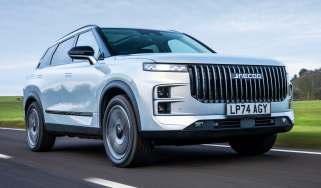Peugeot 407 SW estate (2004-2011)
"Peugeot’s 407 SW puts style ahead of substance, but while it’s no match for a standard estate car, it is a comfortable long-distance tourer."
Pros
- Comfortable long-distance cruising
- Diesel engines all powerful and economical
- Cabin is designed neatly
Cons
- Not the most interesting car to drive
- Comfort around town could be better
- Luggage capacity poor for a large estate car
Much like the Peugeot 407 saloon, the appeal of the 407 SW is hampered by its comparative lack of space and practicality. The 407 SW is neatly styled, however, and some will like the appearance of its gaping-grilled front end. The diesel engine range is impressively economical.
MPG, running costs & CO2
Running costs are impressively low for such a big car, with the most powerful diesel versions nudging 50mpg and the lowest powered HDi 110 diesel almost 60mpg. Only the 41.5mpg HDi 163 version with an automatic gearbox lets the diesel side down - and costs £300 in annual Road Tax. The 407’s three-year warranty runs out at 60,000 miles, so beware if you’re doing big mileages.
Engines, drive & performance
There’s a lumbering quality to the way the 407 SW drives. The gear change and clutch both have an unpleasant springy feel, and the steering, although light, lacks accuracy. The suspension absorbs bumps with ease, but the 407 SW is not great round corners. The 170bhp 2.2 HDi diesel has masses of pulling power in any gear, although the 140bhp 2.0 HDi is hardly lacking in performance, either. The 2.0-litre petrol engine, which can run on E85 biofuel, is quick but needs lots of revs.
Interior & comfort
There’s a little more wind and tyre noise on the motorway than found in the 407 saloon, but the SW remains a comfortable and quiet long-distance cruiser - the seats are especially comfortable. Diesel engine clatter is kept out of the cabin, and the car settles to a pleasantly calm ride at higher speeds. The same can’t be said at lower speeds. The suspension transmits jolts from potholes and coarse road surfaces. Thankfully, the higher roof line means there’s more rear headroom in the SW than in the 407 saloon.
Practicality & boot space
The 430-litre boot is barely any bigger than the saloon’s, and although it expands to 1,365 litres with the seats down, most family estates provide more. The Ford Mondeo’s capacity, for example, extends from 542 to 1,733 litres. Thankfully, the suspension doesn’t encroach into the boot floor, which leaves a useful square load area, and there’s a handy elastic luggage net. Cabin storage for oddments is lacking, however, so you’ll soon run out of places to hold your CDs and travel sweets.
Reliability & safety
Peugeot doesn’t have a flawless reliability record, and 407 owners have reported various electrical and mechanical faults to us. There have been a number of VOSA recalls, many of which involve fuel leaks. However, the 407’s cabin materials certainly feel robust. Safety is great, too, with seven airbags, anti-lock brakes and electronic stability control all standard. Its Euro NCAP safety rating is a maximum five stars.
Price, value for money & options
The 407 SW is priced on par with rivals like the Ford Mondeo, Vauxhall Insignia and Renault Laguna, and it features a lot of comfort and safety equipment as standard. All three trims - S, SR and Sport - have climate control, with the only real disappointment being the absence of alloy wheels on S models. Sport versions have Bluetooth, part-leather seats, automatic headlights and an auto-dimming mirror. Beware of depreciation, though - the 407 loses value faster than most rivals. To protect your cash, negotiate a big discount when you buy it.











